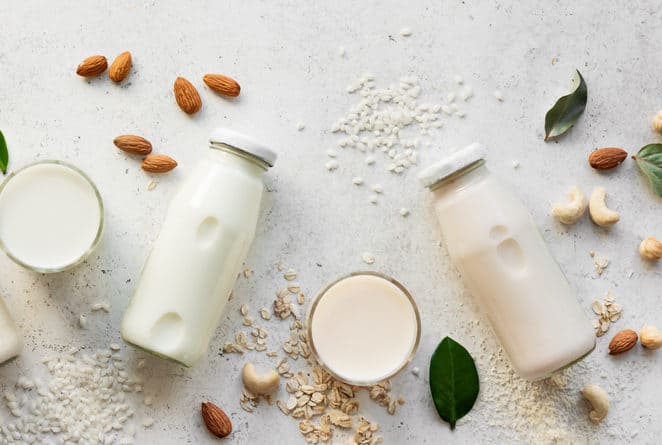
Plant-based milks are more popular than ever, and a wide variety of options are available to choose from. Nut-based milks are one of the more popular choices in this category, with almond milk as the first pioneer and cashew milk following. This trend shows no sign of stopping- reports from 2020 expect a 10% annual growth rate by 2024 in the plant-based milk market. Some people choose these alternatives because they are lactose intolerant or cannot consume animal milk, while others have ethical reasons for a vegan option. Whatever your reasoning, you may be wondering if you should choose almond or cashew milk on your next grocery run. Read on to understand the difference and why you may choose one nut milk over the other.
Unlike traditional milks, nut milks are not made using animals in any way. Both almond and cashew milk are made in similar ways and with the same ingredients- water, and pure almond or cashew pieces. While different flavoring or sweeteners can be added to either, the basic process of making a nut milk involves soaking nuts until they are soft, then blending them with water and removing any solid pulp.
Commercial nut milks may be made using preservatives, thickeners, or stabilizers to fortify the milk with other nutrients and can be compared by brand.
Both almonds and cashews are known as healthy foods and carry those properties into their respective milk. However, they have different benefits and areas in which they are lacking and may compare to dairy milk in different ways.
Almonds are slightly higher in fiber and protein than cashews, though it’s a very small difference. Other nutrients like magnesium, phosphorus, and zinc are present in both, making both almonds and cashews two of the healthiest nuts available. Store-bought versions of these milks often dilute the nutritional value, though this is equal across almond and cashew milk both.
Cashews are known for being very rich in healthy fats and copper. While they contain some micronutrients like calcium and vitamins A, E, and D, both cashew and almond milk are fortified to similar levels as this is legislated by the Food and Drug Administration.
Dairy milk has more naturally occurring protein and calcium, as well as potassium in many cases. Almond and cashew milk are both lower in calories compared to cow’s milk, and unsweetened nut milks have less sugar.
Cashew milk has a creamier texture than almond milk, making it ideal for recipes like soups and cream sauces, as well as coffee creamers. It also means fewer thickening agents may be used.
Additionally, cashew milk has an earthier taste with less nutty notes. Some people do not enjoy the taste of almond milk and therefore prefer cashew milk as it is more versatile.
In most cases, cashew and almond milk can be used interchangeably in recipes, though you may be sensitive to the changes in taste or texture and have a strong preference.
Because many people choose to avoid dairy milk because of ethical and environmental concerns, those same questions may come up when choosing between almond and cashew milk as well.
The vast majority of the world’s almonds are grown in California, and it takes an exorbitant amount of water to produce them. Each almond uses over three gallons of water in the production process. Almonds are also a source of concern when it comes to the honey bee crisis- they pollinate almond trees, and the use of heavy pesticides can impact the honey bee population. Many providers may offer more ethical ways to produce almond milk.
Cashews, on the other hand, have been known for labor concerns and poor working conditions. Most store-bought cashews are exported from India and Vietnam, where workers are paid almost nothing for dangerous work with cashews. The toxins in cashews’ shells that are removed before sale can cause burns and other damage to these workers. How are Beyond’s cashews different from store-bought cashews, you ask? Beyond the Nut is able to provide raw cashews without these ethical concerns by focusing on empowering and involving local farmers in West Africa. All Beyond the Nut cashews are fair trade and ethically sourced, cutting down on ethical concerns and also reducing the carbon footprint.
Depending on your needs, both almond and cashew milk can be great alternatives to dairy milk. Many people prefer the taste of cashew milk and its versatility, and for those with ethical concerns, finding the right product can be difficult. Beyond the Nut cashews make an excellent base for your milk as well as avoiding the ethical pitfalls of many other nut milks.
Fuel Your Beyond with the Latest Discounts, Promotions, and Product Announcements
Free shipping on all U.S. orders over $25! Dismiss